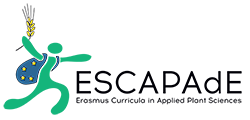English title:
Bachelor's thesis seminar - fruit-growing and horticulture
Course ID:
952110
ECTS credits:
12,0
Title in native language:
Bachelorseminar Obst- und Gartenbau
Bachelorseminar Obst- und Gartenbau
Term Semester:
Spring/Summer
Instruction language(s):
German
Course content:
Problems from horticulture (vegetables, aromatic herbs and ornamental plants) and fruit growing are assigned. In particular, the topics of sustainability, climate change and a resilience in horticultural crops are offered. Groups are also created for this purpose.
Project-oriented teamwork in small groups. The project group actively deals with their respective problem and works on it scientifically-practically.
The Bachelor's thesis is to be subject-oriented, application-oriented and scientific and is to be written in good scientific practice 'according to the rules' within the framework of the Bachelor's seminar.
The work on one of the projects is done in coordination with the supervisors. It includes project plan, activity report, final presentation and bachelor thesis. The latter should also include a reflection on the project, the project plan, own experience, group dynamics.
The horticultural projects will mainly take place at the LVZ Jedlersdorf (probably: tomatoes, aromatic herbs, leaf salads, underexploited veggies...).
The orchard projects (organic peach cultivation, organic strawberry cultivation, table grapes, pome fruits) will also take place mainly at LVZ Jedlersdorf.
Introduction and final presentation take place together, otherwise the supervision work takes place in the respective institutes.
Project-oriented teamwork in small groups. The project group actively deals with their respective problem and works on it scientifically-practically.
The Bachelor's thesis is to be subject-oriented, application-oriented and scientific and is to be written in good scientific practice 'according to the rules' within the framework of the Bachelor's seminar.
The work on one of the projects is done in coordination with the supervisors. It includes project plan, activity report, final presentation and bachelor thesis. The latter should also include a reflection on the project, the project plan, own experience, group dynamics.
The horticultural projects will mainly take place at the LVZ Jedlersdorf (probably: tomatoes, aromatic herbs, leaf salads, underexploited veggies...).
The orchard projects (organic peach cultivation, organic strawberry cultivation, table grapes, pome fruits) will also take place mainly at LVZ Jedlersdorf.
Introduction and final presentation take place together, otherwise the supervision work takes place in the respective institutes.
Expected previous knowledge:
This course is in the 6th semester of the degree programme and should also be attended and completed in this semester after completing significant parts of the agricultural science subjects.
Learning outcomes:
The students:
- acquire the application of scientific methods by means of a scientific project
- learn how to write a scientific paper
- acquire the skills of data processing
- learn the analysis and presentation of results
- gain project-oriented work and experience in "team skills
- expand their knowledge through an introduction to the relevant literature and the use of electronic sources.
Data collection, analyses and writing of project paper according to scientific criteria.
- acquire the application of scientific methods by means of a scientific project
- learn how to write a scientific paper
- acquire the skills of data processing
- learn the analysis and presentation of results
- gain project-oriented work and experience in "team skills
- expand their knowledge through an introduction to the relevant literature and the use of electronic sources.
Data collection, analyses and writing of project paper according to scientific criteria.
Teaching and learning methods:
Completion of the Bachelor's thesis. This will be taken during the course, building on the project presentation.
Teaching method: Group work, project work. Learning method: Application of knowledge and development of new findings/problem solutions.
In the event of a critical COVID-19 situation, alternative methods of detention are offered.
Teaching method: Group work, project work. Learning method: Application of knowledge and development of new findings/problem solutions.
In the event of a critical COVID-19 situation, alternative methods of detention are offered.
Exam method:
Preparation of a Bachelor's thesis combined with a presentation. If the quality of the work is appropriate, later publication at a scientific event or journal is possible.
Presentation (compulsory).
Presentation (compulsory).
Organisation: University of Natural Resources and Life Sciences Vienna
Country:
Austria
Acronym:
BOKU
ERASMUS+ code:
A WIEN03
Teaching period summer semester:
22. Feb 2021 - 30. Sep 2021
Teaching period winter semester:
13. Oct 2020 - 21. Feb 2021
University website:
